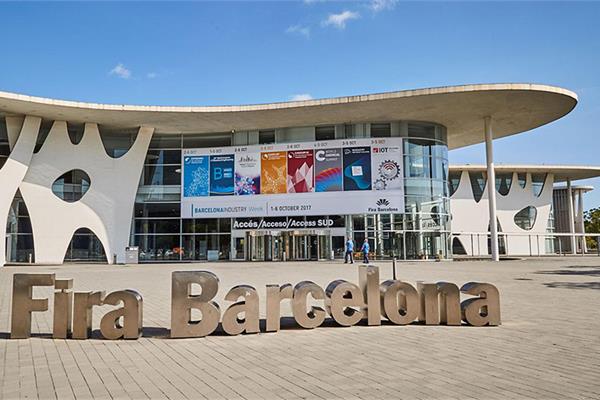
Fira de Barcelona has drawn up an anti-Covid protocol in collaboration with Aon and the Hospital Clínic de Barcelona for the resuming of its event calendar in September.
Fira de Barcelona, in collaboration with Aon and the hospital Clínic de Barcelona, has developed a prevention protocol for COVID-19 to offer the maximum safety guarantees for workers, organisers, exhibitors and visitors in view of the planned resuming of its activity from September onwards by holding events such as Expoquimia, Eurosurfas and Equiplast, among others.
In order to do this as safely as possible, a detailed manual has been developed based on an exhaustive analysis of more than 400 processes associated with the holding of fairs and conferences, and for which nearly 1,000 possible mitigation measures have been identified, which, among other things, include the elimination of some processes and elements that may generate unnecessary risk interactions.
"In view of the new reality resulting from the pandemic, the institution will, as expected, prioritise the safety of all participants in the events that are planned to be organised in the Montjuïc and Gran Via venues during the last four months of the year", said Constantí Serrallonga, General Manager of Fira de Barcelona. "We have carried out a detailed analysis of each of the actions that visitors, exhibitors, workers and suppliers carry out at the fairs, and measures will be implemented to minimise any risks, with the aim of holding them in the best conditions and once again becoming an important lever for the much-needed economic recovery."
The protocol includes wider spaces that guarantee physical distance, artificial intelligence to control visitor flows and the capacity limits, traceability of the attendees' contacts at the venues, possible temperature control at the accesses and reinforced ventilation.
Reinforced access points and artificial intelligence for capacity limits
One of the most important commitment is the digitalisation of some of the activities of the fairs' events such as online registration systems, cashless payment systems at all the venues' establishments and the sale of services online.
Wherever possible, more access points to the facilities will be made available, with entry and pass systems by mobile phone and with the possibility of doing so at pre-assigned times in order to avoid queues.
If necessary, temperature control of the attendees by means of thermal cameras or portable equipment at the entry points will be included.
The capacity limits and flow of visitors will be controlled by means of innovative artificial intelligence systems, the entry and exit routes will be separated, and the movements and contacts made by the attendees will be traceable.
Likewise, the exhibition spaces will be redesigned to ensure separation between individuals, automatic capacity control will be conducted in common areas and the ventilation system will be improved by using antibacterial filters and increasing the air renewal rate. There will also be control points for the use of sanitary face masks and disinfectant gel dispensers will be deployed throughout the venue. The communal areas and frequent contact points will undergo enhanced cleaning.
Protection at the stands and in conferences
The stands will be designed in accordance with the new requirements, with more open and with easier to clean surfaces, reduced capacity limits and enhanced sanitisation controls in place.
The handing out of materials (documents, brochures, welcome packs, etc.) to the exhibitors and visitors is not recommended.
During the conference, attendance will be limited to ensure that safety distances are respected and this will be complemented by digital broadcasting to improve the user experience and increase the global audience.
Food will be portioned into individual units both in the establishments and at the stands, and screens will be installed.
The manual also covers the reinforcement of the medical assistance points, with isolation areas and properly equipped personnel, as well as a section focused on information on the mitigation measures in the event of a risk of contagion which will be conveyed to all exhibitors and visitors of an event to ensure they are aware of the protocols, both in advance and when arriving at the venue.
Prevention and safety measures are provided for in the assembly and disassembly processes, as well as training for personnel and collaborators in the new prevention practices. To ensure compliance with the measures there will also be an Emergency Operations Committee which will periodically re-evaluate the possible risks and adapt the measures where necessary.
Endorsed by the Hospital Clínic
The prevention protocol is endorsed by the Hospital Clínic de Barcelona, a renowned international centre in the field of epidemiology and infectious diseases. Fira de Barcelona and Clínic de Barcelona have signed a collaboration agreement that provides for continuous advice from the healthcare body, as well as the review and validation of the design of safety protocols, the structuring of control needs and strategies from a medical point of view when it comes to resuming the trade fair activity at its venues.
Over the last few months, Fira de Barcelona has been actively participating in defining the course of action to ensure the health and safety of trade fair and exhibition attendees together with organisations that play an important role in the sector, and of which Fira de Barcelona is a member, which include the EMECA (European Major Exhibition Centres Association) and the UFI, the Global Association of the Exhibition Industry; as well as with the Spanish Trade Fair Association (AFE in its Spanish initials), with which it is working to establish a general action protocol with the relevant authorities.